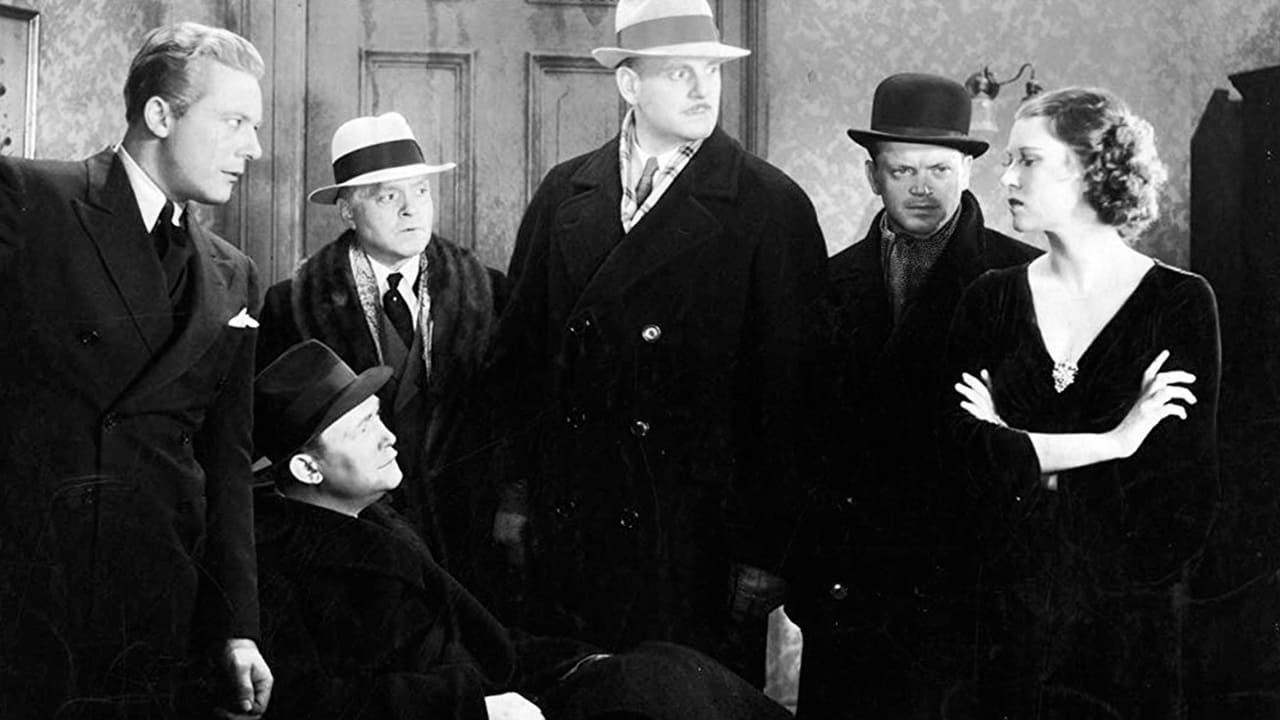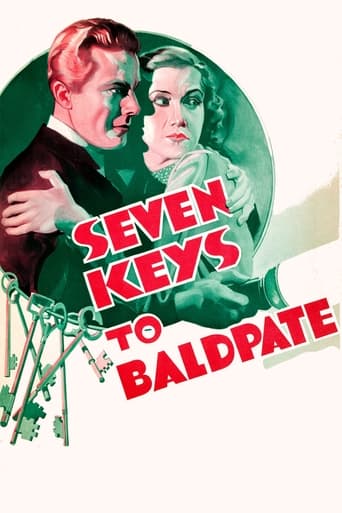

Seven Keys to Baldpate (1935) ** 1/2 (out of 4)Author William Magee (Gene Raymond) shows up at the Baldpate Inn to write a novel in twenty-four hours. The crime writer has a bet to win but before long he finds himself in a real-life mystery as there are crooks, missing money and ghosts to worry about.This George M. Cohan play was a huge hit on the stage and it led to screen versions in 1916, 1917, 1925 and the first sound version in 1929. RKO remade it yet another for this version, which goes for more laughs, although, to its credit, it does slightly play up the ghost factor, which was somewhat overlooked int he 1929 version.If you're a fan of the play (or novel for that matter) then you should find this to be a slightly entertaining adaptation. The main focus are laughs as Raymond delivers a fine performance, which goes for the fast-talking and loud approach that so many films did during this era. You know, those films with the reporter who knows more than anyone else and is smarter than everyone else. On that level this is mildly charming but there's no question that a lot of jokes fall flat.The film does offer up some mild entertainment thanks to the cast, which includes Henry Travers as a sexist hobo who is constantly putting down women and rooting for their deaths! I'm sure this sexist humor was quite funny in 1935 but I'm sure some will be shocked by it. It actually makes the film seem a bit more fresh today.
... View MoreI had seen this movie several years ago and recall not liking it much but thought I would give it another try as I do like Gene Raymond and 1930s mysteries. Writer Bill Magee (Raymond) is on his way to the closed-for-the-season Baldpate Inn. Supposedly, there is only one key to the inn and Magee has it. Magee has to write a novel in 24 hours and requires the peace and quiet that a closed inn will give him (he should be so lucky). As is repeated often "there is only one key to the inn and I have it." The "I" is Magee and six other people. The movie drags at first but does pick up towards the end. Gene Raymond does a nice job and the there is a strong supporting cast (with the exception of the bland Margaret Callahan). My two favorites were Walther Brennan as the Station Agent (one could close one's eyes and still know it was Walter Brennan speaking as his voice was so distinctive) and Henry Travers as the Hermit. I thank the other reviewers for adding the fascinating information about the play and Cohan. I liked this movie better at the second watching but it sure isn't going make my "top 1,000 favorite movies" list.
... View MoreThis oft filmed drawing room mystery gets perhaps its worst treatment with a bad cast to go along with its insipid storyline. Basically a summer stock frolic with hints of Feydeau it boasts two directors, both clueless as they clumsily flub anything salvageable in what is slim pickings to begin with.A writer (Gene Raymond) seeking solitude to practice his craft feels he may have found a perfect spot to concentrate at the deserted Baldpate Inn. He gets more than he bargained for though when some shady characters begin to show up creating dismal havoc.Raymond leads a cast of lifeless dullards through the motions in this Chan like mystery (same author) sorely in need of the charm and wit of Charlie. It is lacking in both mystery and suspense and Raymond and company come across abrasive and flat as they interrupt and out shout each other. Totally bereft of drama and wit Seven Keys to Baldpate is a flawless mess, it misses in every department.
... View MoreGeorge M Cohan's success as a songwriter and performer has obscured the fact that he also wrote or co-wrote many plays, most of which were very successful in their day. But Cohan's plays have dated badly. He relied heavily on one very contrived device. Most of Cohan's plays feature a wide assortment of very old-fashioned stock characters, contrasted with a wise-cracking slang-slinging protagonist (often played by Cohan himself) who speaks directly to the audience, and who comments on the stiffness of all the other characters in the cast.'Seven Keys to Baldpate', which Cohan adapted from a novel by Earl Derr Biggers -- now remembered as the creator of Charlie Chan -- is the only Cohan play which is still revived with any frequency. Even this one is squeaky and creaky. The story has been filmed (to date) *seven* times under its original title, with some disguised remakes such as 'House of Long Shadows' and Gene Wilder's wretched 'Haunted Honeymoon' (which ripped off its one and only funny gag from the unjustly obscure comedy 'Murder, He Says').This 1935 edition is probably the best film version, which isn't saying much. It modernises the material somewhat, deviating significantly from Cohan's original play. Gene Raymond portrays a novelist who comes to the old abandoned Baldpate Inn so as to get some peace and quiet while he writes a novel. He expects to be left alone because he possesses the one and only key to Baldpate ... so nobody else can get in. But then a succession of oddball characters show up, each one weirder than the last ... and each one possesses what he or she claims is the one and only key to Baldpate.There's a 'surprise' ending that's quite obvious, especially if you've seen 'Haunted Honeymoon'. The best performance in this 1935 movie is by Henry Travers, as a crusty hermit who's misogynistic with it, and who is busy writing a manuscript denouncing womankind. 'Hey, mister!' he shouts, interrupting just as Gene Raymond is about to smooch bland leading lady Margaret Callahan. 'If I start a sentence with the word 'women', do I *hafta* use a capital W?' That's a typical example of the weak humour on offer here.Cohan's original play ended with a startling piece of meta-fiction, a coup de theatre in which we learn that the events we've just witnessed are actually the contents of the novelist's manuscript, which he has already written. It would have been an improvement if this 1935 film version had attempted something like that, instead of the flat obvious ending which this movie has. I'll rate it 3 out of 10, mostly for its fine cast of supporting actors.
... View More